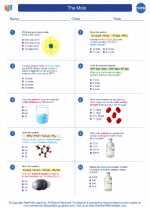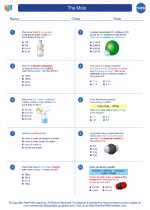Hardness in Chemistry
Hardness in chemistry refers to the resistance of a substance to being scratched or dented. It is an important property of materials and is often used to determine the suitability of a material for a specific purpose, such as in construction, engineering, or manufacturing.
Types of Hardness
There are several types of hardness that are commonly discussed in chemistry:
- Mohs Hardness: This scale measures the scratch resistance of minerals. It is a qualitative scale ranging from 1 (very soft) to 10 (very hard).
- Brinell Hardness: This measures the indentation hardness of materials. It involves applying a specified load to the surface of the material and measuring the diameter of the indentation left by the indenter.
- Rockwell Hardness: This is another measure of indentation hardness, but it uses different scales and indenters than the Brinell test.
Factors Affecting Hardness
Several factors can affect the hardness of a material, including:
- Composition: The chemical composition of a material can greatly influence its hardness. For example, carbon content can affect the hardness of steel.
- Crystal Structure: The arrangement of atoms in a material's crystal lattice can also impact its hardness.
- Temperature: In some materials, hardness may change with temperature due to changes in the crystal structure or other factors.
Applications of Hardness
Hardness testing is used in various industries and fields, including:
- Manufacturing: To ensure the quality and durability of materials used in the production of goods.
- Construction: To determine the suitability of materials for building structures and infrastructure.
- Engineering: To select materials for specific applications based on their hardness and other properties.
Study Guide
When studying hardness in chemistry, it's important to focus on the following key points:
- Understand the different types of hardness tests and how they are conducted.
- Learn about the factors that influence the hardness of materials, such as composition, crystal structure, and temperature.
- Explore the applications of hardness testing in various industries and fields.
- Practice identifying and comparing the hardness of different materials using the Mohs scale or other quantitative measures.
By mastering these concepts, you will be well-prepared to understand and apply the principles of hardness in chemistry.
[Hardness] Related Worksheets and Study Guides:
.◂Chemistry Worksheets and Study Guides High School. The Mole
The resources above cover the following skills:
Chemistry II
Reactions
Use mathematical representations to analyze the proportion and quantity of particles in solution.
Equilibrium
Analyze and interpret data to explain the change in concentration of products and reactants, and the stable state achieved under reversible conditions.



